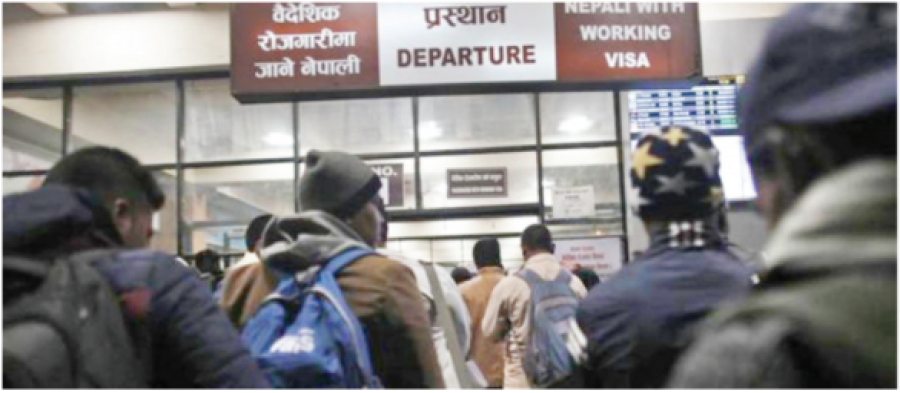National
Flight restrictions at home may prevent workers from visiting Saudi Arabia
Recruiting agencies worry they might lose the opportunity to send workers to Saudi Arabia, which has relaxed its months-long travel ban.
Chandan Kumar Mandal
At a time when many labour destination countries have shut their doors for foreign nationals, Saudi Arabia, a major destination for Nepali migrants, has decided to resume international flights and allow entry to foreigners.
On Sunday, the Gulf kingdom announced that it would be opening its land, sea and air routes, as the months of the travel ban was set to end on Monday.
The decision comes as a relief for Nepal’s labour migration sector, which is going through one of its worst phases because of the Covid-19 pandemic.
“Saudi Arabia deciding to open its borders and allowing international flights is an encouraging development,” said Sujeet Shrestha, general secretary of Nepal Association of Foreign Employment Agencies (NAFEA), an umbrella organisation of Nepali recruiting agencies.
“However, how Nepal will utilise this opportunity is yet to be seen as our own country has suspended international flights and workers’ demand attestation for Saudi Arabia remains affected for several months now.”
When Nepal enforced its earlier flight suspension over the coronavirus pandemic, Nepali migrant workers could not take up jobs abroad, including in Saudi Arabia for several months.
Later, when the Nepal embassy in Saudi Arabia began attesting worker demand documents following the resumption of labour migration, Saudi employers showed interest in hiring thousands of Nepali workers.
According to Shrestha, demand for around 50,000 to 60,000 Nepali workers was expected.
However, recruiting agencies feared that a sluggish process of demand verification by the Nepali mission in Saudi Arabia might lead to job losses for potential Nepali migrant workers.
Now recruiting agencies are worried that they might lose yet another opportunity to send Nepali workers to Saudi Arabia, owing to the issues on the part of the Nepali side, mainly the international flight suspension.
Reeling under the second wave of the Covid-19 pandemic, Nepal government has banned international flights for at least until May 31.
“The government has banned international flights to labour destination countries, where Covid-19 cases are going down, but continued two weekly flights from India, where cases are erupting,” said Shrestha. “Can the government not follow the same protocols and operate international flights to countries like Saudi Arabia and Qatar, among others?”
Following the lifting of the international travel ban, Saudi Arabian Airlines, the national carrier, also announced that it had completed all its preparations to operate international flights at full capacity.
The airlines claimed that it was ready to operate its flights to 71 destinations operating from 95 airports, including 28 domestic and 43 international destinations, according to Saudi Gazette, an English daily newspaper published in the Gulf state.
Recruiting agencies’ concern also comes from the fact that some other labour destinations like Kuwait, the United Arab Emirates, Malaysia and South Korea have already barred entry to Nepali citizens. Nepali workers have not been able to visit Kuwait and South Korea for more than a year while the UAE and Malaysia have recently banned flights from Nepal.
But there is a glimmer of hope for the resumption of labour migration to Saudi Arabia as Nepal is not on its travel ban list.
Although Saudi Arabia had decided to open its borders and operate international flights, its travel ban was said to be still applicable for 20 countries excluding Nepal, Arab News had reported last month.
The list of banned countries has been revised and reduced to 13 countries and Nepal is still not on the list.
“Only if the government operates flights to Qatar, for example, many workers can even reach European countries too. Allowing flights to Saudi Arabia, which has not banned Nepali flights, means those who have secured opportunities there can fly,” said Shrestha. “By not doing anything, we are simply losing opportunities that have come our way even during these tough times.”
For many years, Saudi Arabia has remained one of the most preferred labour destinations for Nepalis. In 2017-18, 11.6 percent of Nepali youths reached Saudi Arabia, before seeing a surge the next year when 19.5 percent of Nepali migrants flew for jobs in the kingdom.
Demand for Nepali workers in Saudi Arabia, which had plummeted in recent years, is once again seeing a rebound. Even in the last fiscal year, when the number of Nepalis pursuing overseas jobs dropped significantly, 83,163 Nepalis still reached Saudi Arabia.
With the reopening of Saudi Arabia for Nepali migrants, it was expected that tens of thousands of jobs will soon be available.
In March, the kingdom also introduced a slew of labour reforms to protect the rights of foreign workers on its soil.
“Saudi is not closed for our workers. However, our government needs to take initiatives for sending our workers there. When other nationals are banned, it can see a high demand for Nepali workers from countries like Saudi Arabia,” said Shrestha. “Employers want our workers, but there are obstacles on our side. Hundreds of Indians had flown to Saudi Arabia from Nepal after flights from India were prohibited. But our workers cannot fly to Saudi Arabia when there is no such ban. This is unfair.”




 12.12°C Kathmandu
12.12°C Kathmandu















